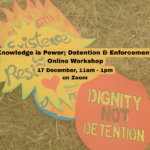
Last night, in the Immigration Bill debate in the House of Lords, peers voted by 187 to 170 in favour of Lord Ramsbotham’s amendment on immigration detention.
If the amendment survives the House of Commons (where the Immigration Bill will go to next), it would mean improved judicial oversight for some people in detention, or who may be detained in the future.
The amendment (which can be read at paragraph 84 here) proposes that a person may not be detained for a period longer than 28 days; or for periods of longer than 28 days in aggregate. However, this period of detention may be extended by the First-tier Tribunal if the Home Office apply for an extension on the basis that “exceptional circumstances of the case require extended detention”.
The amendment in effect calls for increased judicial oversight of the decision to detain someone for longer than 28 days. Immigration detention is the deprivation of someone’s liberty, and the current lack of judicial oversight over such a fundamental deprivation of rights is an outrage.
The UK detains more people, for longer, than any other country in Europe. Rather than the presumption of liberty being upheld (as established in law), the default position of the Home Office has been to detain, detain, detain.
The Home Office makes the decision to detain someone, and it is up to the person detained to challenge that detention. No judge, or indeed no-one acting in a legal capacity at all, looks at that initial decision to detain. A major decision on someone’s life and liberty is taken with no independent scrutiny whatsoever.
For these reasons, we welcome the move towards increased judicial oversight of immigration detention. We also welcome the steady increase in support for the idea of a time-limit on immigration detention, as evidenced in the peers’ speeches last night.
The UK can detain people indefinitely – when people are detained, they do not not know who long they will be locked-up for, and this can often become months and even years.
It is to the credit of campaigners – especially those who have been detained themselves, and whose words have been repeated during recent parliamentary debates on detention – that the lack of a time-limit in the UK has become wholly unacceptable.
Freedom is indivisible
The vote last night was only partial progress. It is gratifying that immigration detention, one of the gravest civil liberty issues of our times, is finally getting the parliamentary detention it deserves. But if these victories are not shared by all those at risk of such a serious injustice, are they victories at all?
The amendment specifically excludes anyone who has been sentenced to a term of imprisonment for a term of 12 months or longer; or anyone the Home Office has determined shall be deported (after a criminal conviction in the UK).
Foreign nationals who have served a criminal sentence in the UK are the people most affected by long-term detention. 30% of foreign ex-offenders are detained for more than six months.
Legal protection from breaches of human rights is essential for everybody, therefore judicial review of immigration detention should be everybody. Particularly when those most at risk of harm and injustice through long-term detention are those excluded from the proposed improvements.
Without a universal time-limit on detention, thousands of people will still face months and years of detention.
Remember, people are not detained because they have committed a crime. According to the government, immigration detention is used to effect removal/deportation from the UK. If people have been convicted of a crime, they serve a criminal sentence in prison. We cannot allow immigration detention to become a way of extending prison sentences by the back-door. The UK has a criminal justice system – this is what the government must use to manage criminality, not a detention system that has even less legal protections and scrutiny than prison.
All kinds of people will continue to be excluded from justice if this amendment is the only reform to detention that we see. People who have been in the UK for most of their lives, asylum-seekers, mothers, fathers, sons, daughters.
Rights and justice for all. No-one left behind.















Discussion: